I’m not the only one to wonder what use it is that China gets out of its “Fifty-Cent Party” (sometimes “Fifty-Cent Army”), a host of trolls who harass critics of China on social media and elsewhere online while showering the Chinese party-state with effusive praise. Their name refers to the rumor that they are paid fifty cents in renminbi for every post.
Fifty-Centers never come off as anything except blind apologists for China, and it is generally pretty obvious that they are Fifty-Centers. However, the point may not be to convince anyone of anything, but merely to drag critics of China into long, unproductive, and tiring debates, shutting off potentially productive conversations.
I’ve wondered what it it’s like to work as a Fifty-Cent Party member. Is it a 9 to 5 job, like being a telemarketer? I had some experience with that sort of job in college, calling up alumni for donations, and frequently being yelled at by those still shouldering student debt; there’s significant emotional labor involved in maintaining a civil tone. But the “Fifty-Cent Party” member is paid precisely to be uncivil. Maybe it’s an emotionally cathartic job.
Some research suggests that Fifty-Centers may simply be government bureaucrats, who aren’t paid fifty cents or anything at all for their work, and are instead assigned a regular quota of posts. Which seems more likely, though the image of the Fifty-Center whose sole daily task is to troll people online seems a good deal more fun.
As someone who writes on Taiwan and China, I’ve been targeted by the Fifty-Cent Party quite a few times. Most of these have been standard boilerplate interactions, and I usually just shrug off or block them after a while.
But close to three years ago I encountered “Ken Wang” (I’m very sure this is not his real name), surely the strangest Fifty-Center ever to live. Despite our interaction having lasted for only an hour or two, I have never quite forgotten it. He began by slinging insults at me, many of which were homophobic. By the end, we would discuss everything from Soviet propaganda to Dr. Seuss.
It was during midterms in December 2015, in the second year of my master’s. I was sitting in the Kent Hall library, the library for the East Asian department at Columbia. It was very cold, early afternoon.
I posted a status update on Facebook: “When I see someone walking in a direction and then they suddenly turn around and start heading in the other direction, I always wonder what happened. In most cases, I realize I will never, ever know.” There were a few responses, from classmates mostly. “We don’t like you. Sorry you had to find out this way,” someone wrote jokingly.
Some hours passed. Then, apropos of nothing, someone I didn’t know, whose profile picture was of a rabbit wearing a PLA military uniform, posted in response: “Some Taiwanese are really intoxicated to live in their laughable fantasy of being independent. Hahahahahaha…. Tell me how to claim de jure independence? Use your Taiwanese mouth???? Any gut to fight the Chinese PLA [People’s Liberation Army]? Don’t be a coward living in NYC but fight to death for your independence dream, which may earn, if any, respect from others?”
As usual, these kinds of interactions usually said a lot more about how contemporary Chinese nationalism looks at the world than anything else. It was a bit surprising that this was all in English, though.
“Thanks for the advice, total stranger,” I responded.
He responded a few minutes later. “We Chinese love to watch ‘Taiwanese independence clown show in which Taiwanese struggle […] in vain. This suddenly makes us Chinese act as a god, who can decide your life and death just like killing a rat.”
Some friends chimed in, commenting on the strangeness of the interaction, and I replied that I would just let him keep going. “I find trolls very flattering for my ego, it makes me feel self-important,” I said. This is the perpetual dilemma of the writer—knowing whether you are being read, if at all. Sometimes I enjoyed these interactions with Internet trolls; at least someone was reading.
Ken responded again. “Wow trolls…Hmmm. Actually I wish I could be troll, at least I could be paid….”
Ken was denying that he was a Fifty-Center, implying that he was just a sincerely nationalistic Chinese netizen. Sometimes this is referred to as being a “volunteer” Fifty-Center.
But here I felt compelled to correct his English. “Troll doesn’t mean 五毛党 [Fifty-Cent Party],” I said, “It just means anyone who harasses anyone else on the Internet.” To my surprise, he pressed “Like” on my comment.
He continued. “Hey, tell me your exact plan how you would face the military action from China if you’d like to pursue de jure independence?” Taiwan is de facto independent of China—the last time the same government controlled both Taiwan and the Chinese mainland was in 1895—but Taiwan is not recognized as an independent nation-state by most members of the international community.
“Oh no no no, don’t understand me my dear Mr 丘琦欣 [Qiu Qixin],” he went on, using my Chinese name. “I’m just here to make you famous….I’ll introduce YOUR NAME 丘琦欣 to the famous anti-Taiwanese website 天涯论坛 [Tianya Luntan] and also the Chinese version of Twitter, Weibo.”
I remember feeling a bit insulted he didn’t think I would know what Tianya or Weibo were.
“I’m flattered by how much energy you are willing to spend on this,” I said.
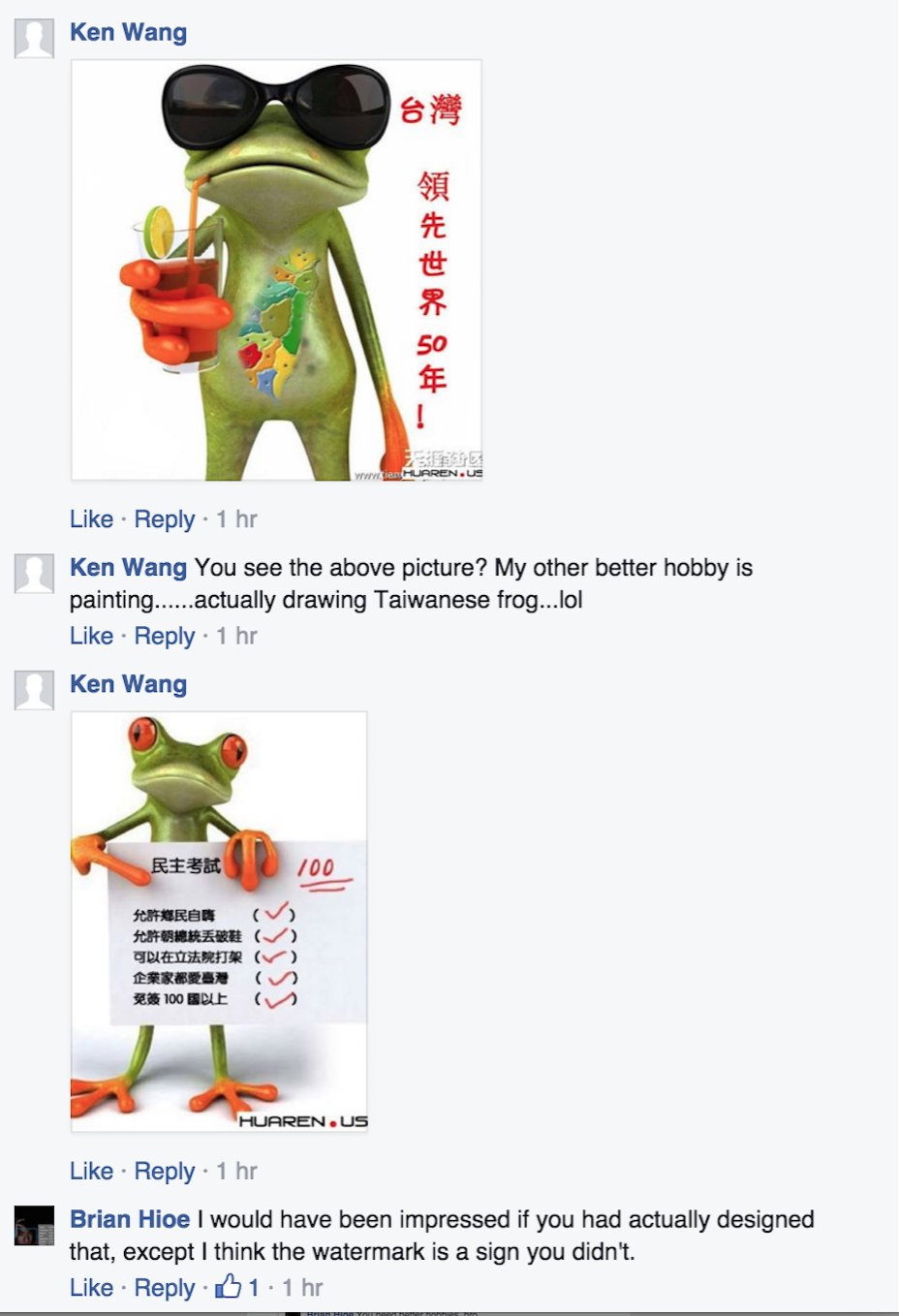 Brian Hioe
Brian Hioe“Hahaha, this is simply my hobby–TFH. TFH stands for Taiwanese frog hunter. 台巴子见一个杀一个 [Tai bazi jian yi ge sha yige, or “Meet a Taiwanese frog, kill a Taiwanese frog”], understand?”, he responded. “Taiwanese frog” is an ethnic slur in China for Taiwanese. He helpfully posted a image of two CGI frogs. “My other better hobby is painting… actually drawing Taiwanese frog”. I commented that I would have been impressed, if not for the obvious watermark.
He next posted an image of a woman’s vagina shaped like Taiwan. “Can you tell me why the great Republic of Taiwan looks like VIRGINIA?????? Hello Mr. Virginia-er from the Republic of Virginia~~~~~~”.
He must have been under the impression that “Virginia” was the word “vagina.” I responded by posting a picture of Virginia. “Sorry, Virginia state looks like this. […] I don’t think it’s shaped very much like Taiwan though,” adding that he might not know US geography too well.
He hurriedly edited his comment to read “vagina” and wrote, “How could an East Asian language major and *BIG* editor not be able to distinguish Virginia from Vagina? Btw, I’m not too far away from Virginia. My US geography is good.”
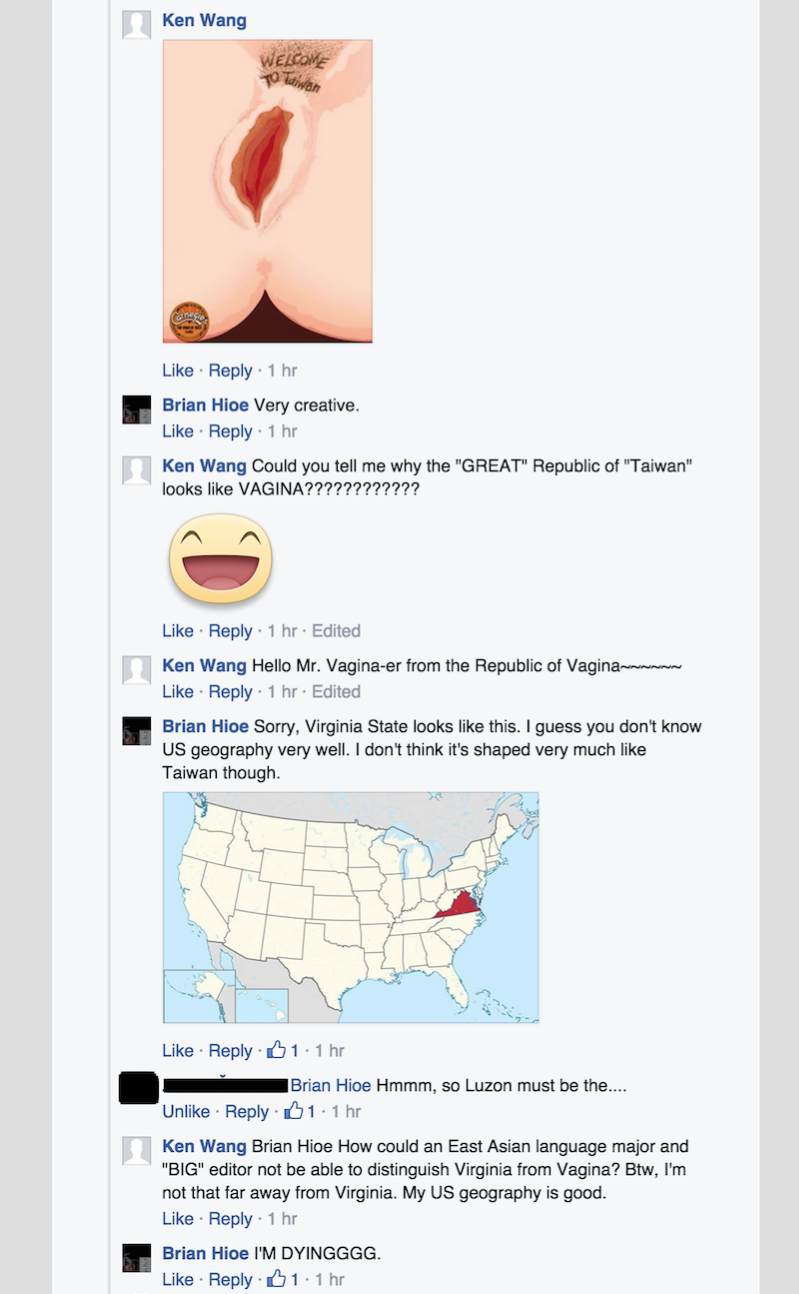 Brian Hioe
Brian HioeHe then returned to describing the imminent annihilation of Taiwan, “All 台独分子 [Taidufenzi or supporters of Taiwanese independence] will DIE, NO DOUBT. It is better to die now than being bombed and killed by Chinese PLA soldiers.” I posted a photo of a dog with the caption, “I am ready for the end.” He posted another picture of a frog in response.
“Don’t you have pictures of anything other than frogs?” I asked. “Do you have any living creatures of anything other than frogs in Taiwan?” he asked. “We have these things,” I wrote, posting a recent meme of a strange slug-like creature found in Taiwan which had gone viral internationally.
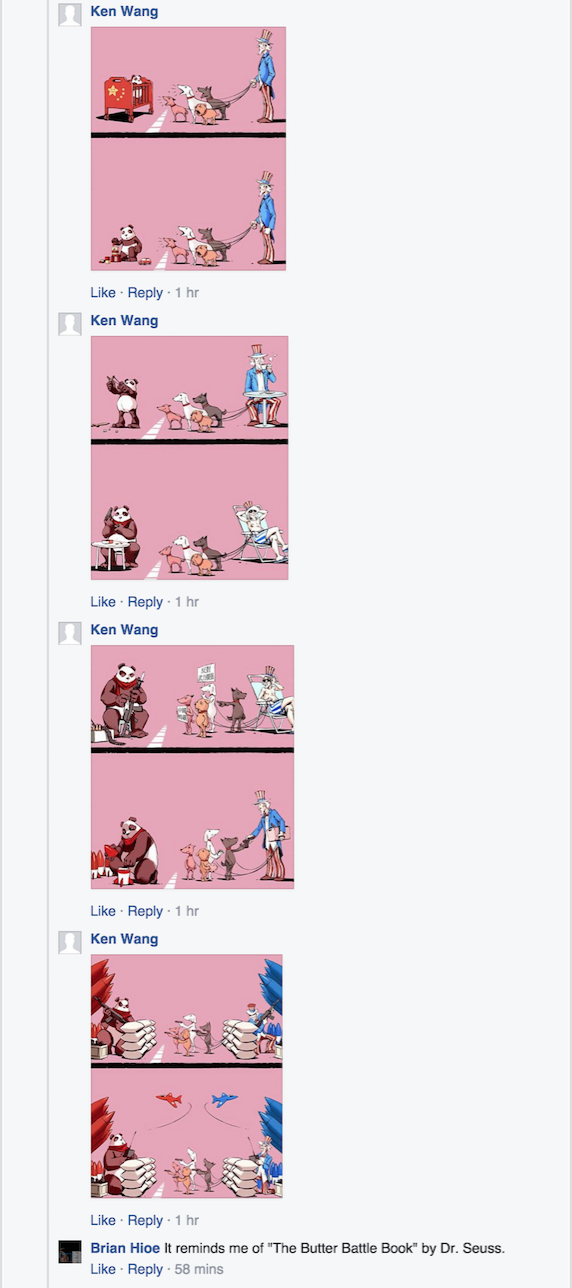 Brian Hioe
Brian HioeKen responded next by posting a series of comics about an arms race between America, represented by Uncle Sam, and China, represented by a panda. In the comic, America has a pack of dogs on a leash, which seem to represent client states of America in the Asia Pacific. “Do you know which DOG is you Taiwanese? The weakest one. Even as a slave dog, you Taiwanese are the weakest dog for Uncle Sam.”
Well, not that he would know it, but I did agree that Taiwan’s subordination to the American empire is a real issue. I commented that the comic, which ends with America and China on the brink of thermonuclear war, reminds me of The Butter Battle Book by Doctor Seuss. I posted a link to The Butter Battle Book on YouTube.
Ken continued, writing in Chinese, to explain that in the comic he’d posted, Taiwan was the pink dog, South Korea was the white dog, the black dog is Japan, and that the yellowish-brown dog was the Philippines. I am completely sure that this was his own interpretation, as there was little in the comic to indicate that any of the dogs represented a specific country.
 Brian Hioe
Brian Hioe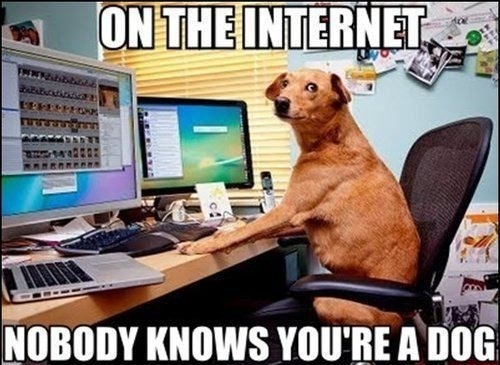 Brian Hioe
Brian Hioe Brian Hioe
Brian HioeI posted a doge meme followed by the old standard, “On the Internet, nobody knows you are a dog.” Ken responded by reposting the Taiwan-vagina meme from earlier, commenting “Everyone knows you are from the Republic of Vagina,” then, “Oh sorry, I forget you are GAY, not interested in vagina. Hahahahahaha. Even Taiwanese gays are at the lowest rank, tooooooo sissy and girlish.”
Chinese nationalists in recent years have increasingly lashed out at the perceived “feminization” of men. I was growing weary of this.
“So you would prefer this?” I posted two pictures from Mao-era Chinese propaganda of strapping, muscular men. One of these was the propaganda poster that, some years later, would become an Internet meme on Reddit, offering the interpretation that the subjects are an interracial Chinese-Russian gay couple that met on a farm, got married, and had kids.
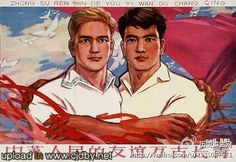
Here’s where the conversation, which had already been strange enough, truly took a turn for the bizarre. “I have these photos on my phone. Actually they look cute,” he said. Followed by “Can Taiwanese gay look that manly? No, even Taiwanese straight sound like a bitchy woman.” He couldn’t help but add, “Btw that Russian man in the poster looks too Chinese…”
I agreed; the Russian man and the Chinese man in the poster did in fact look uncannily similar, something that the artist could have worked on. “I’m just telling you the painful truth you Taiwanese don’t dare to face. Because I know you guys sooooo well,” Ken went on.
“Can I just say you are a cute bottom?” he added. He posted a picture of me he had gotten from somewhere. “Are you single? Do you have a boyfriend?”
“Why don’t you just admit you are hot for me?” I responded, tired of these juvenile antics.
“No, my boyfriend is stronger and more manly than you,” said Ken. “But you are good too. Maybe I like dark eyebrow. But you may need to be stronger or gain more weight to be more attractive.”
I….so…what? So, apparently, Ken was attracted to men and had a boyfriend, never mind the homophobia earlier? I suppose homophobes who later turn out to be gay are far from unheard of, case in point, homophobic Republican senators, but still I was flabbergasted. Not sure how to respond, I posted a thumbs up gif.
“Have you come out to your parents?” Ken suddenly wrote. Was he confiding in me about himself, I wondered? Or hoping that I could share a relatable experience?
And then…that’s all. Nothing more came from him after that. A quarter of an hour passed. Eventually, I decided to just block him, to go eat dinner, and get on with preparing for midterms. A friend later commented of the exchange, “I couldn’t tell if he was serious or not, and, if the former, if he was angry or strangely aroused.”
In the early days of the Internet, before the rise of social media, it was possible to develop connections with complete strangers through anonymous Internet chat rooms. I guess this is still possible today, though social media makes it very easy to connect offline with online identities.
I still think about this exchange, years later, and wonder who exactly Ken was and what motivated him. I think it is likely that he was telling the truth when he said that he was not an actual Fifty-Center. I have had friends relate to me accounts of Fifty-Centers weirdly and expectedly breaking character before, but Ken still seemed beyond the pale.
I tried looking him up before I wrote this, but it seems his account has been suspended. I later also found a thread on Tianya which seems to have come from Ken, in which he posted the names and pictures of a number of Taiwanese independence activists, like myself, bragging about his exploits in intimidating them. As I sat in Columbia’s East Asian library that afternoon, nobody seemed to find this exchange more hilarious than the Chinese students studying at Columbia, who kept coming up to me and remarking that they had been watching the fireworks on Facebook. Years later, sometimes somebody will still comment on how they haven’t forgotten this exchange. Looking back, it might have been the highlight of graduate school for me.
Brian Hioe






